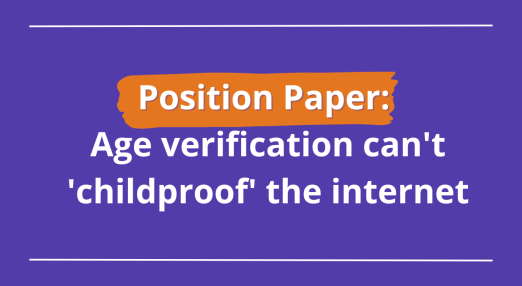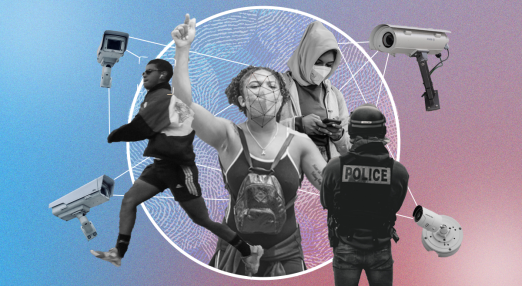Position Paper: Age verification can’t ‘childproof’ the internet
EDRi has published its policy paper on age verification to shed light on the risks of the widespread use of age verification and to chart out possible alternative solutions.
Filter resources
-

Position Paper: Age verification can’t ‘childproof’ the internet
EDRi has published its policy paper on age verification to shed light on the risks of the widespread use of age verification and to chart out possible alternative solutions.
Read more
-

Open Letter: European Parliament must protect journalists and ban spyware in the European Media Freedom Act
As the European Parliament gets set to vote on the European Media Freedom Act (EMFA) next week, 80 civil society and journalists’ associations are calling on Members of European Parliament (MEPs) to ensure meaningful protection for journalists in the regulation by including a total ban on spyware.
Read more
-

Czech police use facial recognition system, IuRe finds out details
EDRi member Iuridicum Remedium have details on the Czech police’s illegal use of a facial recognition system. The country’s data protection authorities were not consulted in advance on the system, which is being used for biometric identification
Read more
-

Are we about to lose the last pillar of our digital security?
Breaking encryption and criminalising its use will not resolve the deep societal issues we are facing. Instead, governments should protect and promote the very tool that ensures our digital security.
Read more
-

Press Release (CSA Regulation): Who benefits from the EU Commission’s mass surveillance law?
A newly-published independent investigation uncovered that the European Commission has been promoting industry interests in its proposed law to regulate the spread of child sexual abuse material online.
Read more
-

How to request access to your personal data stored by Europol: a guide
This guide is for everyone who wishes to access personal data on them that is processed, or has been processed, by Europol. Access requests help us to understand the extent of the agency's data collection and processing activities, and increase scrutiny.
Read more
-

Council of Europe must not water down their human rights standards in convention on AI
In a joint statement, civil society calls for a broad scope and definition of AI systems and no blanket exemptions for AI systems for national defence/national security.
Read more
-

European Parliament’s CULT committee set to greenlight controversial amendment to the EMFA in today’s vote
The European Parliament’s CULT committee is set to vote on the EMFA. The committee is likely to approve the contentious 24-hour must-carry amendment that could make it harder to fight disinformation, and would undermine the Digital Services Act.
Read more
-

Is this the most criticised draft EU law of all time?
An unprecedentedly broad range of stakeholders have raised concerns that despite its important aims, the measures proposed in the draft EU Child Sexual Abuse Regulation are fundamentally incompatible with human rights.
Read more
-

Council poised to endorse mass surveillance as official position for CSA Regulation
The Council of EU Member States are close to finalising their position on the controversial CSA Regulation. Yet the latest slew of Council amendments – just like the European Commission’s original – endorse measures which amount to mass surveillance and which would fundamentally undermine end-to-end encryption.
Read more
-

LIBE Committee’s opinion fails to include a total ban on the use of spyware in the European Media Freedom Act
EU Parliament's LIBE committee voted on its position on the European Media Freedom Act (EMFA) and failed to call for a total ban on the use of spyware against journalists.
Read more
-

Open letter: Hundreds of scientists warn against EU’s proposed CSA Regulation
Over 300 security researchers & academics warn against the measures in the EU's proposed Child Sexual Abuse Regulation (CSAR), citing harmful side-effects of large-scale scanning of online communications which would have a chilling effect on society and negatively affect democracies. The letter remains open for signatures.
Read more
